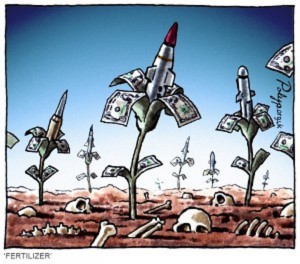Paul J. Sauders writes: Notwithstanding its extensive arms trade with Algeria, Russia’s political relations with President Abdelaziz Bouteflika and his government seem curiously constrained. On one hand, Algeria is a top market for Russian weapons. For example, Russian media have only recently reported a massive 2014 deal under which Algeria will assemble 200 T-90 tanks using kits supplied by Russia’s state arms supplier Rosoboronexport — a contract one Russian military expert estimated at $1 billion and described as “possibly the largest export contract for main battle tanks in the world.”
According to the report in the business-oriented newspaper Vedomosti, the contract follows a 2010 sale of 185 T-90 tanks as well as a 2013 agreement to buy equipment to modernize 300 Soviet- supplied T-72 tanks. At the same time, Russia is reportedly building two Kilo-class submarines for Algeria. In 2006, Rosoboronexport announced a $7.5 billion sale of jet fighters, training aircraft, missile systems and tanks after a meeting between Russian President Vladimir Putin and Bouteflika that also yielded an agreement to write off $4.74 billion in Soviet-era debt held by Russia.
On the other hand, the Kremlin website does not report a Putin-Bouteflika meeting since the 2006 session, although then-President Dmitry Medvedev traveled to Algeria to meet his counterpart in 2010.
Russian and Algerian officials have interacted more frequently at lower levels, of course. Still, Foreign Minister Sergey Lavrov has apparently not met bilaterally with Algeria’s Foreign Minister Ramtan Lamamra since February 2014.
Kiriyenko signed a nuclear cooperation agreement that sounds analogous to America’s so-called 123 Agreements — a defining foundation for future talks rather than a commitment to any specific projects.
Russia’s relationship with Algeria looks like cautious and hyper-pragmatic interaction between two governments that may want a variety of things from one another but have trouble reaching a broader understanding on key issues. In some respects this would be an extension of their Cold War relationship, in which Algeria’s nationalists were more than willing to accept Soviet arms — and to define their independent country as a People’s Democratic Republic and to pursue socialist economic policies — but were not so interested in substituting one colonial master for another.
While Russia surely welcomes Algeria as an arms customer — especially while its economy is struggling under sanctions — Moscow seems unlikely to get what it may want most from Bouteflika and his government. Given Algeria’s role as a leading gas supplier to Europe, and therefore a leading alternative to Gazprom, energy cooperation may well be first on the Kremlin’s list. Despite this, Gazprom’s role in the country remains limited to some modest exploration activities. Perhaps more significant, Russia has been largely unable to co-opt Algeria to advance its energy geopolitics strategy toward influencing Europe. Moscow has not permitted its inability to get everything it desires from Algeria to stand in the way of what it can accomplish. And selling 200 tanks for $1 billion is indeed an accomplishment.

